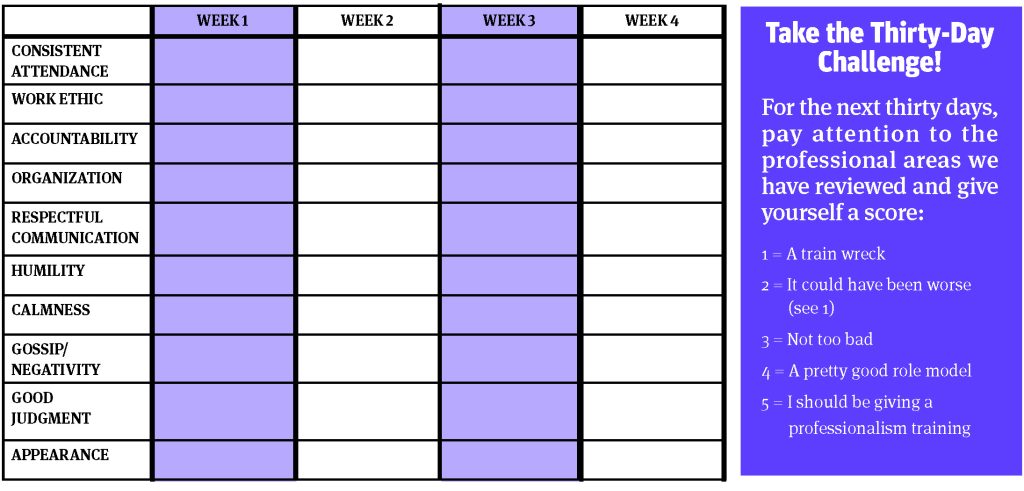Share
Professionalism is as defined “the skill, good judgment, and polite behavior that is expected from a person who is trained to do a job well” (Merriam-Webster, 2020). This quality is not restricted to what we might call “professional” careers, typically defined as careers that require a lot of education and have high earnings associated with them. Van drivers, peer counselors, and servers can demonstrate a lot “professionalism,” while doctors and executive directors can display very little. This article will describe several categories that affect professionalism and provide tips for maintaining professionalism in the workplace.
What Does Professionalism Look Like?
Consistent Attendance
Being skilled or competent will not matter if you are not there. Some team members never miss work and always arrive on time. Other team members have a more relaxed attitude towards attendance and punctual arrival. Even if your organization is pretty relaxed, build a reputation as someone who is on time, every time. This is not limited to arriving on time to work in the morning; make sure you arrive in a timely fashion to meetings and other commitments, too. When you arrive late for work or meetings, it gives your boss and coworkers the impression you do not care about your job. Also, if it affects them, it is like saying you do not value their time. Pay attention to the clock, set alarms if you have to, show up at least a few minutes before you are supposed to start work, and return from your breaks on time. When you are consistently on time, you are reliable.
Work Ethic
“Work ethic” may seem like an old-fashioned term, but trust me when I say it makes the difference in your ability to achieve your professional goals. It means that you come to work prepared to work, and take pride in your contribution to the agency. Your work is a reflection of you and your efforts. Work ethic means that your work matters to you. Use your time productively at work, focus on your job responsibilities, and avoid getting pulled into social media, web browsing, gossip, and texting while on the clock. You may need to leave your phone in your car if you find it too distracting.
Accountability
Professional employees consistently deliver the results they are accountable for, on time or early. When you agree to take on a responsibility, it is an agreement between you and the employer that you will deliver what you have committed to deliver. If something prevents you from doing so, let people know well in advance.
Professionals also hold themselves accountable for their thoughts, words, and actions, especially when they have made a mistake. This personal accountability is closely tied to honesty and integrity, and it is a vital element of professionalism. As hard as it may be to do, own your mistakes and then do your best to correct them. When you run into problems and obstacles, take the time to brainstorm a few solutions and alternatives before you meet with your supervisor so you do not get a reputation for being a blamer or complainer.
Finally, and this one is hard, avoid blaming others for your errors, even if they deserve it. The goal is to keep your side of the street clean.
Structure and Organization
A professional employee is well organized. Your desk is in order with the files, forms, and supplies needed to do the job. This prevents you from needing to run around looking for a stapler while in the middle of a group! Organization requires advanced planning, timeliness, and attention. Focus on improving your time management and planning skills so you can concentrate on clients or groups when in session and so you will not be distracted.

Respectful Communication
Most people would agree that communicating respectfully with your boss or members of the senior management team is a given, but when you are a true professional—and a decent human being—you also speak respectfully to the janitor, the receptionist, and the people who may not have the ability to immediately help you achieve your goals. Being gracious and polite will help you in most interactions. Keep in mind that the addiction field is a fairly small pool and it is entirely possible that you will one day be working with the same people, even if you change agencies. Your behavior towards others will follow you, so being respectful is a wise career precaution.
Humility and Willingness to Learn
Professional employees are confident, but do not walk around the office arrogantly bragging about their accomplishments. They are humble and kind, and will offer to help others because most of us entered the addiction profession from a spirit of service. It will be helpful for you to be a team player who understands that your contribution is only one part of a bigger equation, and that everyone’s contribution makes a difference. Additionally, it is a sign of humility to admit what you do not know, be curious, and be available to learn something new. This may even mean being proactive—seeking out needed trainings on your own to keep upping your game.
Calmness
Responding with emotional outbursts or letting your emotions negatively impact your ability to communicate with others will undermine your professionalism. When you feel your emotions rise, do not respond right away. It could be five minutes, an hour, or a day, but taking a little time to think or to reread your e-mail before you hit send will help rein in a response that is coming from a place of emotion, rather than professionalism. Do not misunderstand: it is okay to show emotion at work. When those emotions take over, however, it undermines your ability to achieve your goals and makes you look like you cannot handle yourself.
Staying calm includes communicating in a direct, timely, and honest manner. Communicate with the goal of helping, not hurting, the receiver. Tell the truth in a way that allows the other party to accept the truth. We have all heard jerks who arrogantly say, “I was just being honest. It’s not my problem they didn’t like the truth!” but professional people communicate in a way that is helpful and motivational.
One of the things that will help you stay calm is increasing your self-awareness. You can learn to manage your emotions and gain awareness of your emotional triggers so you can manage your reactions positively and productively. Accept and reflect on the feedback you receive to assist you as you learn and grow, and ask yourself, “Is it true? Partially true? Not true?” If you are in recovery yourself, you will need to stay close to your support network; working on other people’s recovery plans for eight hours per day is not the same as working on your own recovery plan. Staying connected with your self-care plan will help you to develop coping skills to manage setbacks and challenges with a positive and constructive attitude.
Gossip and Negativity
If you have time to gossip, then you do not have enough work to do. Truly professional people do not have time to spread drama around the workplace. While confiding in a close friend at work is usually okay, sharing too much information with the entire office is not. Be careful about whom you talk to, particularly when it comes to discussing problems you are having with your spouse or other family members. If you do decide to share something personal with your coworkers, do not do it where customers or clients might overhear you.
Similarly, negativity is an important thing to consider. In general, people like to be surrounded by positive individuals. The workplace is no exception; people enjoy working with team members who have positive attitudes. Those who are always negative think they are realists, but often do not realize that others consider their negativity a lack of professionalism (and frankly a drag). In fact, it can infect the whole workplace like a dark cloud.
Good Judgment
Having good judgment is a pretty broad topic, and a lot of examples fall into it. Take swearing, for instance. The problem with swearing is you never know who you will offend. You could spew out a string of foul words, and some people would not bat an eyelid. On the other hand, some people are offended even by relatively mild words (e.g., “damn”). Professionals communicate what they need to without the risk of offending someone with their word choices. In general, the goal is to “know your audience” and match the environment and role you are in.
Professional Appearance and Good Hygiene
Finally, it is a myth that you need to “look like the clients” to create a bond with them. In fact, the way to show your clients respect is to look like you have come to work on purpose and are not stopping by on your way to Walmart on the weekend! While your clothing style should match your environment (e.g., suits versus business casual), in general this includes coming to work with clean and tidy clothing, shirts with buttons, and shoes that are not sneakers. For women in particular, hemlines and chest lines should be modest. In general, Dockers or slacks are preferable to jeans for the workplace, though you need to be comfortable. Undergarments should not be showing. You should have your hair combed, teeth clean, and deodorant applied. People have more trust in someone who has taken the time to take care of their appearance. If we are in recovery, we are role models for recovery. If someone walks into your center and mistakes you for a client, this is a sign you are not taking your professional role seriously.
Conclusion
It is interesting to note that individuals may be the most experienced counselors or supervisors and totally lack any semblance of professionalism. In fact, most of you may have worked with people like this at some point—you think to yourself, “Shouldn’t they know better?” Professionalism has less to do with what you do in your job (i.e., the results you produce) and a lot more to do with how you produce those results.
References
Merriam-Webster. (2020). Professionalism. Retrieved from https://www.merriam-webster.com/dictionary/professionalism
About Me
Mary Crocker Cook, PhD, DMin, LMFT, LAADC, developed and is the current program coordinator for the San Jose City College Alcohol and Drug Studies Program. She is a published author at marycrockercookbooks.com and offers CEUs for RADT, CADC, LAADC at counselorsceu.com. Crocker Cook is a current CCAPP board member for District 7 and on the board of the nonprofit Many Paths One Destination, the United Nations for recovery.











 Counselor Magazine is the official publication of the California Association of Addiction Programs and Professionals (CCAPP). Counselor offers online continuing education, article archives, subscription deals, and article submission guidelines. It has been serving the addiction field for more than thirty years.
Counselor Magazine is the official publication of the California Association of Addiction Programs and Professionals (CCAPP). Counselor offers online continuing education, article archives, subscription deals, and article submission guidelines. It has been serving the addiction field for more than thirty years.